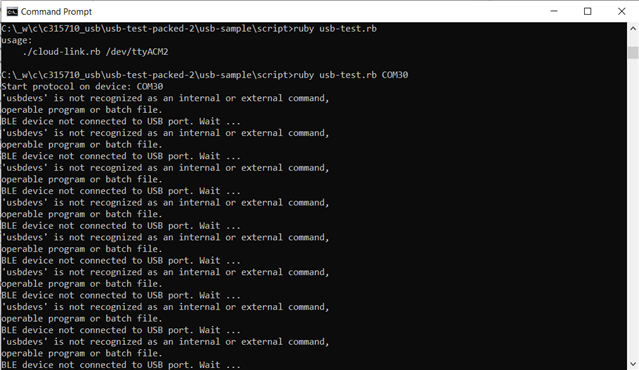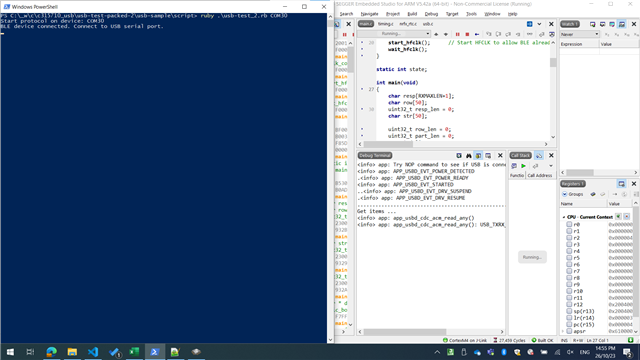To handle RX of USB CDC ACM we are polling data using:
ret = app_usbd_cdc_acm_read_any(&m_app_cdc_acm, m_rx_buffer, MIN(BUFFER_SIZE,size));
On
case NRF_SUCCESS:
rx_size = app_usbd_cdc_acm_rx_size(&m_app_cdc_acm);
copy_rx_data(buffer, n, m_rx_buffer);
We assume data has been transferred to our use buffer `m_rx_buffer` and get the data directly.
On
case NRF_ERROR_IO_PENDING:
usb_txrx_state = USB_TXRX_STATE_RX;
We assume data has been NOT been transferred and assume to we get the data in the event handler instead.
void cdc_acm_user_ev_handler(app_usbd_class_inst_t const * p_inst,
app_usbd_cdc_acm_user_event_t event)
{
app_usbd_cdc_acm_t const * p_cdc_acm = app_usbd_cdc_acm_class_get(p_inst);
last_usb_cdc_event = event;
ret_code_t ret;
switch (event)
{
...
case APP_USBD_CDC_ACM_USER_EVT_RX_DONE:
rx_size = app_usbd_cdc_acm_rx_size(p_cdc_acm);
copy_rx_data(buffer, n, m_rx_buffer);
This works well until the end of the data (583 bytes in total) is transferred.
On the NEXT TO LAST call to app_usbd_cdc_acm_read_any() we get NRF_SUCCESS and get correct data.
On the last call to app_usbd_cdc_acm_read_any() we get NRF_ERROR_IO_PENDING, but we see that correct data anyway has still been transferred to m_rx_buffer.
But because we assume there are no data directly available (it should be fetched in event handler) we make an intermediate call to:
while (app_usbd_event_queue_process()) {
}
To finalize the transfer event handler.
Stepping through app_usbd_event_queue_process() we see the following sequence of calls ...
#if (APP_USBD_CONFIG_SOF_HANDLING_MODE == APP_USBD_SOF_HANDLING_COMPRESS_QUEUE)
if (p_event_item->sof_cnt > 0)
{
if (p_event_item->start_frame > USBD_FRAMECNTR_FRAMECNTR_Msk)
{
p_event_item->start_frame = 0;
}
sof_event.drv_evt.data.sof.framecnt = (p_event_item->start_frame)++;
--(p_event_item->sof_cnt);
app_usbd_event_execute(&sof_event);
return true;
}
#endif // (APP_USBD_CONFIG_SOF_HANDLING_MODE == APP_USBD_SOF_HANDLING_COMPRESS_QUEUE)
==> app_usbd_event_execute(&(p_event_item->evt));
...
/**
* @brief @ref app_usbd_class_methods_t::event_handler
*/
static ret_code_t cdc_acm_event_handler(app_usbd_class_inst_t const * p_inst,
app_usbd_complex_evt_t const * p_event)
{
ASSERT(p_inst != NULL);
ASSERT(p_event != NULL);
ret_code_t ret = NRF_SUCCESS;
switch (p_event->app_evt.type)
{
...
case APP_USBD_EVT_DRV_EPTRANSFER:
==> ret = cdc_acm_endpoint_ev(p_inst, p_event);
break;
...
static ret_code_t cdc_acm_endpoint_ev(app_usbd_class_inst_t const * p_inst,
app_usbd_complex_evt_t const * p_event)
{
==> ret = cdc_acm_rx_block_finished(p_inst);
...
static ret_code_t cdc_acm_rx_block_finished(app_usbd_class_inst_t const * p_inst)
{
...
==> memcpy(p_cdc_acm_ctx->rx_transfer[0].p_buf,
p_cdc_acm_ctx->internal_rx_buf,
bytes_to_cpy);
The final memcpy finally COPIES OLD DATA from p_cdc_acm_ctx into our user buffer (which contained good data).
So there seems to be some internal USB stack state machine problem here ...
To summarise:
1. Correct data is transferred from app_usbd_cdc_acm_read_any() even if we got NRF_ERROR_IO_PENDING.
2. Consective call app_usbd_event_queue_process() copies old data (i.e. overwrites good data) to user buffer. This should not be possible if USB state contained in p_cdc_acm_ctx is valid.
3. We dont get APP_USBD_CDC_ACM_USER_EVT_RX_DONE event as expected until user buffer is overwritten by app_usbd_event_queue_process()
We are using SDK 17.0.2.
We have enabled APP_USBD_CDC_ACM_CONFIG_LOG_ENABLED, but it does not give any good indication.
One addional note: This is size dependent as well. So if last call returns data pending (which seems to be size dependent) internal buffer seems to be corrupted.
615 OK
593 - 599 OK
581-592 NOK




